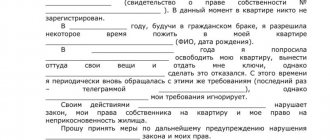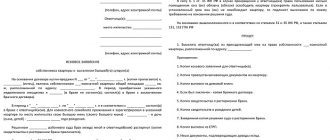Home » Housing disputes » How to evict tenants who do not pay if there is no agreement and according to the agreement
1
Renting your own apartment is very popular, since not everyone can afford to buy their own home. On the other hand, if you own a residential property, then this is a good addition to your family budget. But, often, this is a risky undertaking.
No one is safe from careless tenants who, when concluding a contract, swear that they will comply with all clauses of the contract, and then forget to pay for housing. What remains for the landlord? Try to reason with the unnecessary tenant, and if that doesn’t work, evict.
Does the owner of an apartment have the right to kick out tenants?
Any owner of residential premises can dispose of it at his own discretion, including renting it out, registering any citizens, including tenants, in his living space, in return he has the right to demand compliance with order and monthly payment for housing.
According to the Housing Code of the Russian Federation, the employer must comply with all clauses of the contract and bear payment obligations. When concluding a written contract or by oral agreement, the parties discuss all the nuances of living in an apartment and the procedure for paying rent and housing and communal services:
- cash;
- transfer to the owner's account;
- independent payments for housing and communal services and additional surcharge to the owner;
- in any other manner satisfactory to both parties.
If the tenant violates the terms of the contract, the apartment owner has every right to terminate the contract and demand that the tenants leave the premises.
Reasons
Many owners of residential premises have little understanding of why they have the right to kick out tenants and what they should be guided by.
Grounds for termination of lease agreements:
- the tenant violates the terms of the contract (applicable in cases where a lease agreement was concluded);
- complaints from neighbors about malicious violation of their rights, systematic rows, alcohol abuse, frequent noisy parties, etc.;
- lack of maintenance of residential premises, unauthorized redevelopment, bringing residential premises into an uninhabitable state;
- use of residential premises for other purposes;
- arrears of rent, utility bills;
- threat to the life or health of others.
If the owner discovered the listed violations and demanded the tenants to move out of the living space they occupied, and they are in no hurry to comply with the request of the apartment owner, then, depending on whether a lease agreement was concluded or not, there are two options for the development of events:
- if the agreement has been concluded, then the eviction occurs with the help of the judicial authorities;
- if the tenant lives under an oral agreement, then the tenants will have to be evicted with the help of police officers; the court will not accept the statement of claim without an official rental agreement for the residential premises.
If there is an agreement, if the tenant does not pay rent, eviction is possible in two ways:
- if a short-term (for a period of up to 12 months) contract was concluded, then eviction is possible if the debt is at least two months;
- when concluding a long-term contract (from one to five years), the owner can file an eviction claim if the tenants owe him more than six months of rent for the apartment.
But, in any case, the court will take into account the life circumstances of the tenants, for example, if the debt arose due to a long-term serious illness of the tenant and he was limited in funds during this period, most likely the court will give him a deferment in repaying the debt.
Conditions and grounds
In order to evict those living there without a lease agreement from an apartment, the desire of the apartment owner is first necessary. After all, if tenants do not violate the rights of third parties (neighbors), then they are not obliged to vacate the living space. All the neighbors can do is contact the apartment owner and notify them that the tenants are disturbing them.
The grounds for eviction of tenants are:
- systematically do not pay rent;
- use the residential premises for other purposes (shop, office, warehouse, etc.);
- keep the apartment in unsanitary conditions;
- change of owner of residential premises;
- violate the norms of generally accepted behavior (drinking alcohol, rowdy behavior, etc.);
- cause damage to the home itself or the property located in it;
- other reasons.
Since tenants who have not entered into an agreement with the owner of the apartment are usually not registered in it, they can be evicted quite easily. Most often, it is enough to send them a demand for eviction within the established time frame.
However, there are situations when residents do not want to move out voluntarily. The reasons can be very different. For example, the lack of other housing or the landlord's unwillingness to return the rental deposit. In this case, the only correct solution would be to go to court. After all, if you use force or threats against tenants, you yourself may be subject to administrative or even criminal liability.
Read more: Children who are left without parental care are
Example. Sokolova A.R. allowed a distant relative N.K. Pankratova, who came to receive higher education, to live in the second room of her apartment. The women did not draw up a lease agreement; they limited themselves to a verbal agreement. After six months of living, Pankratova began to cohabit with V.N. Kiselev and installed a lock on the door of the rented room. Sokolova repeatedly asked Pankratova and Kiselev to move out of her apartment, but they did not agree. The owner of the apartment repeatedly appealed to the district police officer, but he explained that residents could only be evicted from her apartment by a court decision. Then Sokolova went to court at her place of residence with a claim to recognize Pankratova as having lost the right to use the apartment. The court, having considered all the materials of the case, having heard both sides, came to the conclusion that the plaintiff’s demands are legal and must be satisfied in full. Pankratova and Kiselev were forced to leave their living space.
The nuances of eviction of tenants
If the tenant pays the rent on time and does not violate the terms of the contract, but you do not want to rent the apartment to him (for various reasons), then you will need to wait until the end of the lease agreement; you are unlikely to be able to evict the tenant before this date.
But if the tenant does not comply with the terms of the contract, you have the right to terminate this contract early.
Let's consider the most common situations with early termination of a document.
The tenant lives without concluding a rental agreement
Most often, the owner allows acquaintances or relatives to live for some time without a contract, or allows strangers into the living space on the recommendation of relatives. If the tenants have not lived up to the trust of the apartment owner, then he can evict them according to the following algorithm:
- notify negligent tenants that they must move out;
- give them some time to find alternative housing;
- if the tenants have not moved out before the specified date, file a complaint with the law enforcement authorities; usually, one conversation between the district police officer and the unwanted tenant is enough for him to comply with your request.
Renting an apartment without a contract is a rather risky undertaking. A tenant can take advantage of the fact that the owner does not have any documents confirming the fact of his residence and not pay rent for the apartment. But the owner cannot complain to the court or law enforcement agencies, since he himself violates tax laws by renting out the apartment without a contract.
According to the rental agreement
D
The contract is drawn up in free form. The document specifies the details of the transaction, stipulates the rights and obligations of the parties, the procedure for payment for accommodation and use of housing and communal services, as well as possible sanctions in case of violation of any clause of the contract.
This document protects the apartment owner from violations by the tenant, while at the same time restricting him from some actions undesirable for tenants, for example, it will not allow early termination of the contract without sufficient grounds.
For example, citizen Lavrentieva entered into a lease agreement for a period of one year with the Ponomarev family. According to the document, the Ponomarevs had to transfer the rent monthly to Lavrentyeva’s card. But after six months the payments stopped, Lavrentieva waited three months and filed a lawsuit to collect rent arrears and evict unscrupulous tenants.
After receiving a summons to appear in court, the Ponomarevs left the apartment on their own, took all their belongings and disappeared in an unknown direction without paying for their stay. They did not appear in court.
Lavrentyeva filed a second claim, where she indicated that the tenants had violated the terms of the contract, they had not paid rent for the last three months, and their location was unknown. The court made inquiries, established the new place of residence of the violators and sent a summons to the new address. When considering the new claim, the court, taking into account the circumstances of the case, decided to recover arrears of rent from the defendants, and also oblige them to reimburse all legal costs of the plaintiff.
The tenant has temporary registration in the rented apartment
Early termination of the contract simultaneously cancels the owner’s permission to temporarily register the tenant in his residential premises. Any significant violation of the clauses of the contract is a direct basis for notifying the employer of the violation, the requirement to eliminate this violation and, if the notice is ignored, unilateral early termination of the contract.
There are often cases when an apartment owner registers a stranger without drawing up an agreement; in this case, the following circumstances may be the reason for deregistration:
- the guest is absent from the place of registration for more than six months;
- the tenant is undergoing compulsory military service upon conscription, or is serving under a contract in another locality;
- he is sentenced to imprisonment;
- declared missing;
- violates the rules of residence;
- Forgery of documents for temporary registration was discovered.
Usually, citizens who come from another locality are asked to temporarily register in a residential area. In cases where the owner of a residential premises has grounds for deregistration of a temporary tenant, but the latter does not agree with the eviction, the owner of the apartment may apply to the court with a claim for deregistration.
Without trial
There are often cases when a tenant signs a rental agreement, moves into an apartment, and then realizes that the rent is high for him and he will not be able to pay it on time and in full. Or the tenant experiences some events, after which he loses his previous income and also cannot pay for housing in the future. There are times when a tenant simply decides to move to another city.
In this case, he turns to the owner of the property with a request for voluntary termination of the lease agreement. Of course, the tenant must pay all current payments without leaving rent arrears, otherwise the owner may file a claim to collect rent arrears.
In case of voluntary termination of the contract, the parties can draw up an act of acceptance and transfer of residential premises from the tenant to the owner. Such an act will protect each party from possible fraudulent actions of opponents. When transferring housing from a tenant to the owner, the latter checks whether everything in the apartment is in place and in proper condition, and the tenant once again makes sure that he has not accidentally left some of his things.
How to evict unscrupulous tenants from your home
You can also enter into a lease agreement from an individual (without registering an individual entrepreneur or a limited liability partnership). You will need to pay individual income tax (IIT), which will be levied on income received from renting an apartment. According to the law, individuals who rent out apartments have the right not to register as an individual entrepreneur. But they are required to annually submit a personal income tax return and pay this tax.
- the tenant uses the property in significant violation of the terms of the contract or the purpose of the property, despite a written warning from the landlord to stop such actions;
- the tenant intentionally or through negligence significantly degrades the property;
- the tenant fails to pay fees for the use of the property more than 2 times after the expiration of the payment period established by the contract;
- in cases where, in accordance with legislative acts or an agreement, the obligation for major repairs lies with the tenant, the tenant does not carry out major repairs of the property within the time period established by the lease agreement, and if they are not included in the agreement, within a reasonable time period.
How to evict tenants who do not pay and live under an agreement
So, the owner of the residential premises entered into a rental agreement with the tenant of his apartment. Some time passes and the monthly payments stop. What should an apartment owner do?
It will be illegal to simply come and throw out the debtor; the landlord must comply with pre-trial procedures and act strictly according to the law; for this he must perform a series of sequential actions.
The forced eviction of an unscrupulous tenant is divided into three stages.
Stage one . Pre-trial dispute resolution procedure:
- establishing a violation (delay in receipt of rent for several months);
- a written warning to residents that they are violating the contract and a requirement to eliminate the violation before the date specified in the document;
- if the debt has not been repaid - a written notice with a requirement to immediately leave the occupied residential premises.
Stage two . Eviction by court:
- collecting necessary documents and searching for witnesses;
- filing a claim;
- visiting the court office and submitting a statement of claim along with a package of documents;
- participation in court hearings;
- obtaining a court decision.
Stage three . Execution of eviction:
- transfer of the writ of execution to the SSP and opening of the enforcement case;
- forced eviction of violators by SSP employees;
- drawing up an act of acceptance and transfer of residential premises.
The procedure is lengthy, but violating it is strictly prohibited. If, for example, you, even having a court decision on eviction that has entered into force, decide to carry out a forced eviction on your own, then your unlucky tenant may sue you for arbitrariness. And if someone gets hurt as a result of your violent actions against a tenant, then you may face criminal prosecution.
List of documents
To force eviction for rent arrears, the owner must have a certain package of documents, namely:
- a copy of the residential lease agreement;
- copies of the statement of claim (at least three copies);
- a photocopy of the apartment owner's passport;
- title documents for residential premises;
- in the event that, according to the agreement, the tenant himself had to pay for utilities - a personal account statement;
- documents available to the apartment owner confirming payment (or lack of payment) for rental housing, these can be receipts for receipt of funds, payment orders, bank account statements;
- notifications about the inadmissibility of delays in paying for housing and demands for repayment of accumulated debt;
- witness testimony (provided that the witnesses agree to repeat this testimony in person at the trial);
- receipt for payment of state duty.
Sample statement of claim
The statement of claim must be written in compliance with the rules for drawing up legal documents and must not contain legal or grammatical errors. The text of the document should not contain jargon, offensive definitions, or vague, meaningless phrases.
Sample statement of claim for eviction of tenants
How long will the eviction take?
The approximate period for eviction of tenants with the help of the court is from three months to six months; in some cases, when the defendant does not agree with the court decision and files an appeal, the eviction can drag on for up to a year.
During the entire period while the litigation lasts, and the defendant continues to fail to pay rent, the debt for the apartment accumulates, and a rather impressive amount of debt can accumulate. Therefore, lawyers recommend that in claims for eviction for rent debts, in addition to the demand for eviction, the second requirement should be the collection of arrears in payments for the apartment.
Expenses
The plaintiff will have to pay a state fee. The cost of the state duty, as when filing any claim of a non-material nature, is 300 rubles.
If the plaintiff is not sure that he can draw up a statement of claim on his own, he can contact a competent lawyer; the cost of drawing up a claim varies from one to three thousand rubles, depending on the region and the qualifications of the lawyer.
Where to begin
The issue of eviction of tenants must be resolved with a correct assessment of the situation. In different circumstances, the actions will be different. The key question is whether there is a rental or rental agreement concluded with the residents. If there is no contract, eviction from the apartment will be faster and easier.
If there is an agreement, you need to pay attention to the following facts:
- whether the agreement has expired;
- what grounds for termination are indicated in the text;
- Are there any special individual conditions stipulated in the agreement regarding the eviction of tenants, which must be adhered to?
Important! The absence of an apartment rental agreement is convenient only in case of forced eviction. In other cases, you cannot do without it. For example, when it is necessary to recover damage caused to an apartment or to compensate for the losses of flooded neighbors below, the contract will become the central evidence in the case.
How to evict tenants who do not pay and live without a contract
Some apartment owners, in order to avoid tax deductions, prefer not to enter into a rental agreement and move in tenants by verbal agreement. In this case, the transaction is considered unofficial and has no legal force; in this case, it is impossible to prove the fact of non-compliance with the agreement, since there is in fact no agreement as such.
No court will accept an eviction claim if there is no lease agreement. Everything is simple here: if there is no agreement, then in fact there is no transaction, which means we cannot prove the very fact of renting a residential premises.
What to do?
If the owner committed such a rash act and moved in tenants without concluding a lease agreement, only by oral agreement, then if the tenants violate these agreements, you need to try to solve the problem amicably:
- provide the tenant with a deferment in payment of rent;
- if the tenant is ready to move out, but needs time to find a new home, give this time (of course, within reason);
- Explain to him that law enforcement agencies can be involved in resolving the problem.
If persuasion does not help, there is only one thing left to do - write a statement to the police.
In any case, the owner of a residential premises should not engage in arbitrariness:
- install new locks, limiting the resident’s access to his belongings;
- throw out the tenant's belongings from the apartment, or take them somewhere without permission;
- use physical force or threats of physical violence.
All these actions fall under an administrative violation, which may be punishable by a fine. And if, as a result of physical pressure on the tenant, the latter receives any injuries, then criminal prosecution is possible.
Usually, contacting the police with a statement that strangers are illegally staying in the apartment and a subsequent visit to the tenants by a police officer is sufficient. It is clear that a tenant evicted in this way is unlikely to pay the debt to the apartment owner, but this is already the cost of saving the apartment owner on paying taxes.
Documentation
When applying for help in eviction from law enforcement agencies, the owner must have with him some documents:
- any identification document;
- certificate of ownership of the apartment, or any other document of title to the residential premises.
Application addressed to the district police officer (sample)
An application or complaint to the district police officer against illegal occupants is submitted to the police department at the location of the apartment. It must contain the following information:
- Full name and title of the precinct commissioner in whose name the application is being drawn up;
- personal data of the apartment owner;
- the essence of the conflict with residents renting residential premises (it would be best to write that citizens are in the residential premises illegally);
- a request to understand the situation and help resolve it;
- date and signature.
Sample application for eviction to a district police officer
Deadlines
As a rule, five to seven days are enough to evict tenants living without a contract.
How to evict tenants with children
Russian legislation imposes quite serious requirements for the forced eviction of minors, but this applies only in cases of children living in apartments where their parents or guardians are the owners, or they live there on the basis of a social tenancy agreement.
In the case of eviction from a rented apartment, this rule does not apply: the owner of the apartment has every right to evict any tenants, but there are some restrictions here:
- the owner of the residential premises must notify the family with minor children in advance of his intention to evict them;
- It is impossible to evict a family with children on an emergency (expedited) basis, especially if the violation is not serious enough.
Otherwise, the procedure for eviction of a family with minor children is exactly the same as for eviction of other tenants:
- if there is a lease agreement - with the help of the court;
- in the absence of a document - with the involvement of law enforcement agencies.
How to evict tenants with temporary registration?
It happens that the owner agrees to temporary registration of residents in his apartment. In such a situation, you can evict the tenants after it ends.
Read more: Household characteristics from neighbors sample for guardianship
There are two options for ending temporary registration:
- completion of the registration period;
- court decision on early termination.
After completion of the registration period, the tenant loses the right to use the communal apartment. At the request of the owner, he must change his place of residence. Otherwise, the issue will be resolved in court.
If a tenant does not pay utility bills on time, has conflicts with neighbors, or leads an immoral lifestyle, the owner has the right to apply for early termination of registration. This issue is also resolved through the court.
You should know! If children are registered with the employer, they can be discharged only after the parents receive a new registration. Otherwise, it will not be possible to evict the tenants.
Arbitrage practice
As judicial practice on the eviction of tenants shows, the owner has sufficient grounds for early termination of the lease agreement. It is unlikely that the court will accept a claim for early eviction if the plaintiff files it on flimsy grounds, or if the pre-trial procedure for resolving the conflict is not followed.
Let's illustrate this with an example from a real trial.
Citizen Shutov inherited a two-room apartment in the city center from his deceased mother. Since he had his own house within the city, it was decided to rent out the apartment. He entered into a lease agreement for a period of five years with the Novikov family. According to the terms of the agreement, the Novikovs had to pay rent on the fifteenth day of each month in cash, Shutov had to pay all utility bills himself, and the tenants had to hand over the bills to him along with the next payment for the apartment.
For more than two years, the tenants regularly paid the rent, but then delays in payments began, and the further they went, the worse. Over time, a debt accumulated in an amount exceeding six-month payments. Shutov repeatedly reminded his tenants of the need to pay the accumulated debt, but each time the tenants asked to wait a little longer, since they were having minor financial difficulties.
After some time, Shutov learned that the Novikovs had recently traveled abroad on a tourist package and were soon planning to go on vacation again. He had a serious conversation with the tenants, where he demanded to immediately, within a week, pay the rent debt and leave the premises. The Novikovs again refused to pay, explaining that they had large debts.
The owner decided not to wait any longer and filed a statement of claim for early termination of the lease agreement; the second point of the claim was a petition to collect all outstanding payments from the defendants. The court satisfied the plaintiff's demands in full.
To summarize:
- The owner of a residential premises has the right to terminate the lease agreement early if the tenants violate one or more clauses of the agreement in court on the basis of non-payment of rent payments.
- He can also, in the absence of an agreement, involve police officers to evict the violators, but in this case he is unlikely to be able to collect the rent debt.
- The presence of minor children is not an obstacle to eviction of tenants.
- You cannot independently engage in forced eviction of tenants; this is arbitrariness, which may result in administrative punishment. Forced evictions can only be carried out by SSP employees.
FREE CONSULTATIONS are available for you! If you want to solve exactly your problem, then
:
- describe your situation to a lawyer in an online chat;
- write a question in the form below;
- call Moscow and Moscow region
- call St. Petersburg and region
Save or share the link on social networks
Author of the article
Natalya Fomicheva
Website expert lawyer. 10 years of experience. Inheritance matters. Family disputes. Housing and land law.
Ask a question Author's rating
Articles written
513
- FREE for a lawyer!
Write your question, our lawyer will prepare an answer for FREE and call you back in 5 minutes.
By submitting data you agree to the Consent to PD processing, PD Processing Policy and User Agreement
Useful information on the topic
5
Statement of claim for eviction from an apartment
There can be many reasons for eviction. A careless tenant who in no way...
2
How to evict your roommate from your apartment
Neither legal nor civil marriages provide guarantees of long and...
3
Is it possible to evict tenants in winter?
Renting out an empty apartment is quite a profitable business, especially...
1
Privatization of land under an apartment building
You can privatize not only a separate residential building, apartment or land...
Privatization of an apartment through the MFC
Privatization of an apartment is a complex and lengthy process, but for many...
4
How much does it cost to privatize an apartment?
Privatization of an apartment is a free procedure, but only within the cost...








